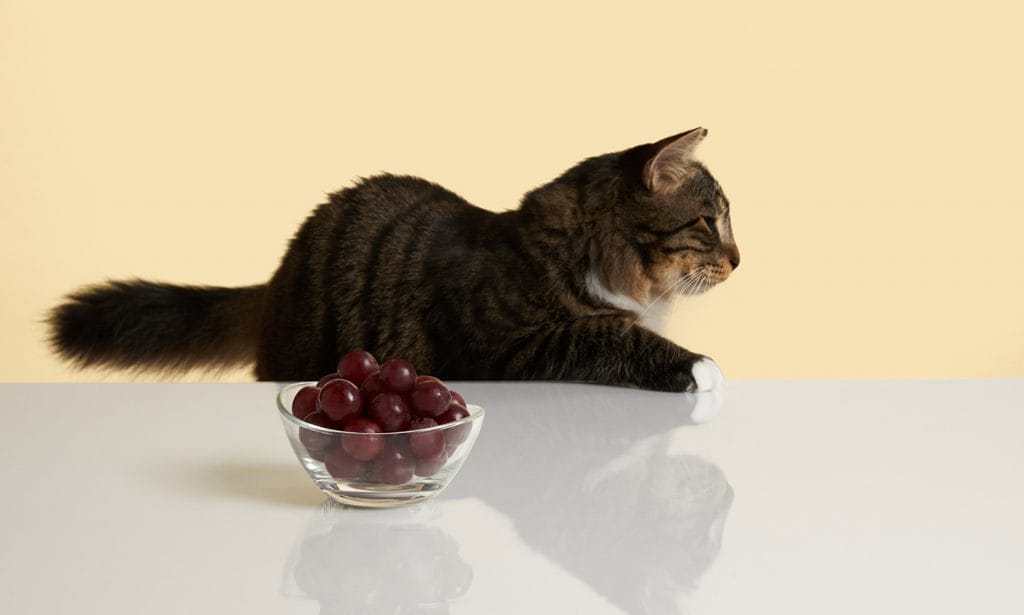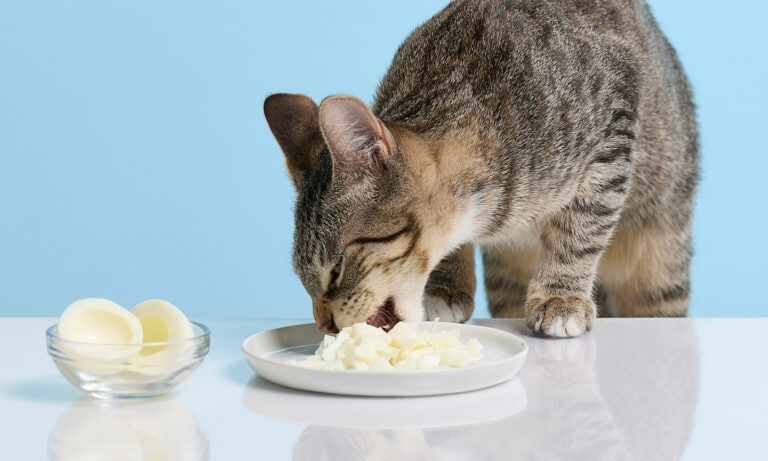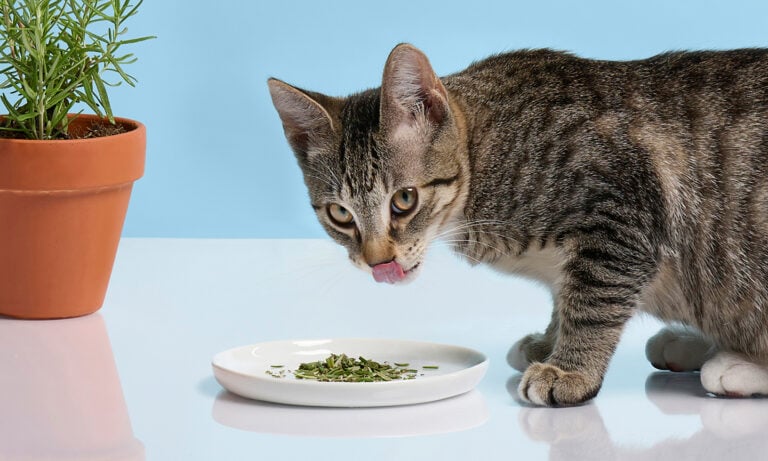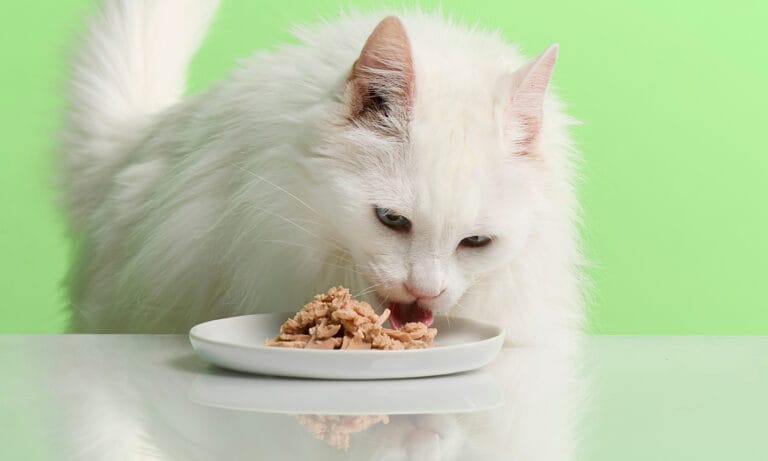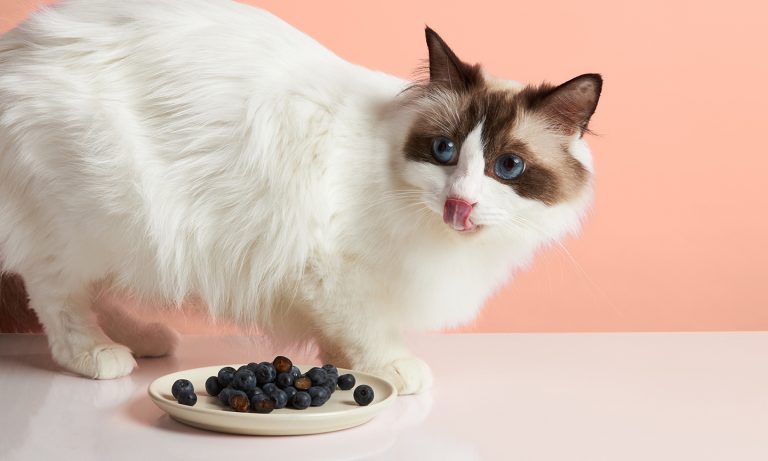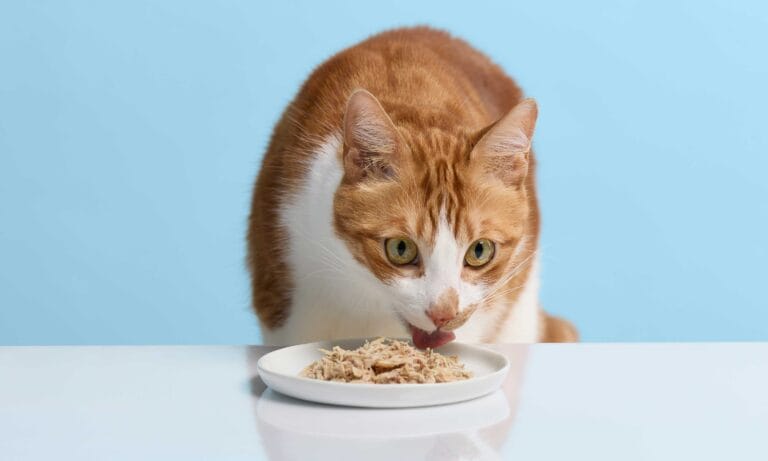Why Can’t Cats Eat Grapes?
Cats can't eat grapes because grapes can potentially bring on toxicosis, as well as bring on rapid development of kidney failure, says Dr. Rachel Barrack, DVM, CVA, CVCH, and owner of New York City-based veterinary practice Animal Acupuncture.
Experts are still trying to figure out which particular substance in grapes poses a risk to cats and dogs. They think that either salicylate (such as in aspirin), a mycotoxin (a toxic substance produced by mold or fungus) or something in grapes called tartaric acid, could be the culprit. But even though we don’t know exactly how the toxicity works, pet parents should infer that grapes in any amount are poisonous to cats, meaning not even one small grape in your cat’s food repertoire. Pet parents should avoid feeding grapes, grape offshoots or grape-based products to cats.
“While this is better documented in dogs, it’s still inadvisable to feed grapes and raisins to cats,” Dr. Barrack says.
What Are the Symptoms of Grape Toxicity in Cats?
If your little sweetheart’s been caught in the act of chomping a grape, keep a close watch on them, call your vet or a poison control hotline immediately and look out for the following symptoms.
Symptoms of grape toxicity in cats include:
- Vomiting
- Diarrhea
- Lethargy
- Lack of appetite
- Increased thirst
- Bloating
- Weakness
- Tremors
- Abdominal pain
“Some signs typically occur within hours of ingestion,” says Dr. Barrack, adding that it’s important to take action quickly because:
- Without further intervention, kidney failure can develop within three days.
- If the kidneys shut down, your pet will stop producing any urine.
- Kidney failure has the potential to be fatal.
What Should I Do If My Cat Eats Too Many Grapes?
If your cat eats too many grapes, contact your primary care veterinarian immediately, even if you don’t see symptoms, says Dr. Barrack. Because toxic reactions to grapes progress swiftly, you want your cat treated as soon as possible.
Try to determine how many pieces of fruit your cat may have eaten. And if you can’t reach your veterinarian, try an animal poison hotline such as:
- The Pet Poison Helpline number (855) 764-7661
- The ASPCA Animal Poison Control Center (888) 426-4435
What Kinds of Grapes Should Cats Avoid?
All grapes, raisins, currants and products that contain them should be avoided when feeding cats, says Dr. Barrack.
That includes:
- Grapes with seeds: No, cats can’t eat grapes with seeds. Even small numbers of seeded or seedless grapes, raisins, currants or grape products can potentially cause kidney failure in some animals, Dr. Barrack says.
- Cooked grapes, raisins and currants: Don’t feed your pet any dishes that might contain grapes or a grape derivative.
- Grape products, like jams, jellies, juices: Also avoid raisin bread, fruit sauces and raisin desserts such as cakes and cookies.
- Grapes sprayed with chemicals: “All grapes, raisins and products that contain them should be avoided when feeding cats,” says Dr. Barrack.
Keep grapes away, period. All grapes and raisins—no matter what color they are (red, purple or green, for instance), and regardless of whether or not they’re seeded or seedless, organic or commercial—can lead to toxicity in cats.
How Can I Prevent My Cat from Eating Grapes?
For starters, don’t give your cats access to grapes. Keep them out of sight and keep a close watch on your cat when you do eat grapes.
Here are some ways to prevent your cat from eating grapes:
- Don’t leave grapes in a spot your cat can access. Keep grapes in the fridge and the dried versions, like currants and raisins, in cat-proof bags or containers that your smart feline can’t open. Also, don’t leave grape-laden grocery bags unattended because any kitty worth their salt will undoubtedly decide to investigate.
- Mind the table scraps. This is particularly crucial during the holiday season, when there may be lots of raisin-type desserts and sweets hanging around.
- Never engage cats to play with grapes as a game. Grapes are little and might seem like a fun item to toss around with your best bud, but grapes are not a substitute ball or cat toy of any kind.
- If you drop any, pick them up. If you or another family member happen to drop grapes on the floor, be sure to retrieve them right away.
- Enforce grape rules. Make sure grape-loving visitors know the deal on grapes, especially these three grape practices:
- If you drop it, pick it up.
- Don’t leave grapes unattended.
- No sharing with kitty.
Why Does My Cat Love Grapes?
Cats may love grapes for a few reasons. For starters, grapes are toy-sized and easy to bite!
Other reasons include:
- They’re accessible. Human foods like grapes are often left out on a tabletop bowl where pets can easily reach them.
- It’s a texture thing. Grape stems have an interesting feel and appearance that might draw your cat’s attention.
- Boredom. Felines sometimes taste and, yes, swallow odd things out of mere boredom or inquisitiveness. If one drops on the floor, your furry friend might find that a clear invitation to bat it about or try a lick or two.
What Fruits Can Cats Eat?
Cats can eat a wide variety of fruits (in addition to their regular cat food, of course). While many fruits are not toxic to purr babies, for optimal cat health and wellness, cats need protein from meat-based cat food.
Fruit cat treats (and any snacks for that matter) should take up no more than 10 percent of their daily calorie intake. Reserve fruit for just occasional cat treats.
With that in mind, there are several fruits that, in moderation, are safe for your little gourmand, including:
- Apples and pears (peeled and without seeds)
- Berries such as blueberries, strawberries, raspberries, cranberries and blackberries
- Seedless watermelon
- Mangos
- Pineapples
- Apricots
- Honeydew
- Nectarines
- Bananas
A word to the wise: Cats are obligate carnivores and need meat. So, lean meat snacks are ideal. Some healthy snack alternatives to fruit for cats include:
- A tablespoon of cubed cooked chicken
- Deli turkey meat, about a tablespoon torn up
- Cooked, lean beef
Fruits cats can eat:
Share:
